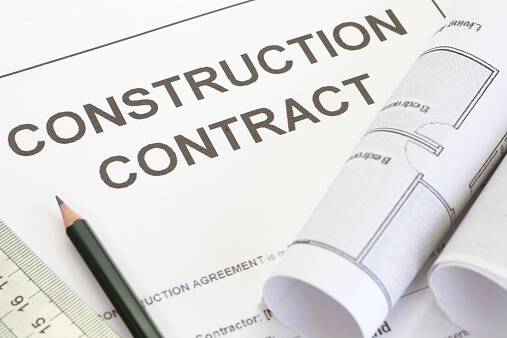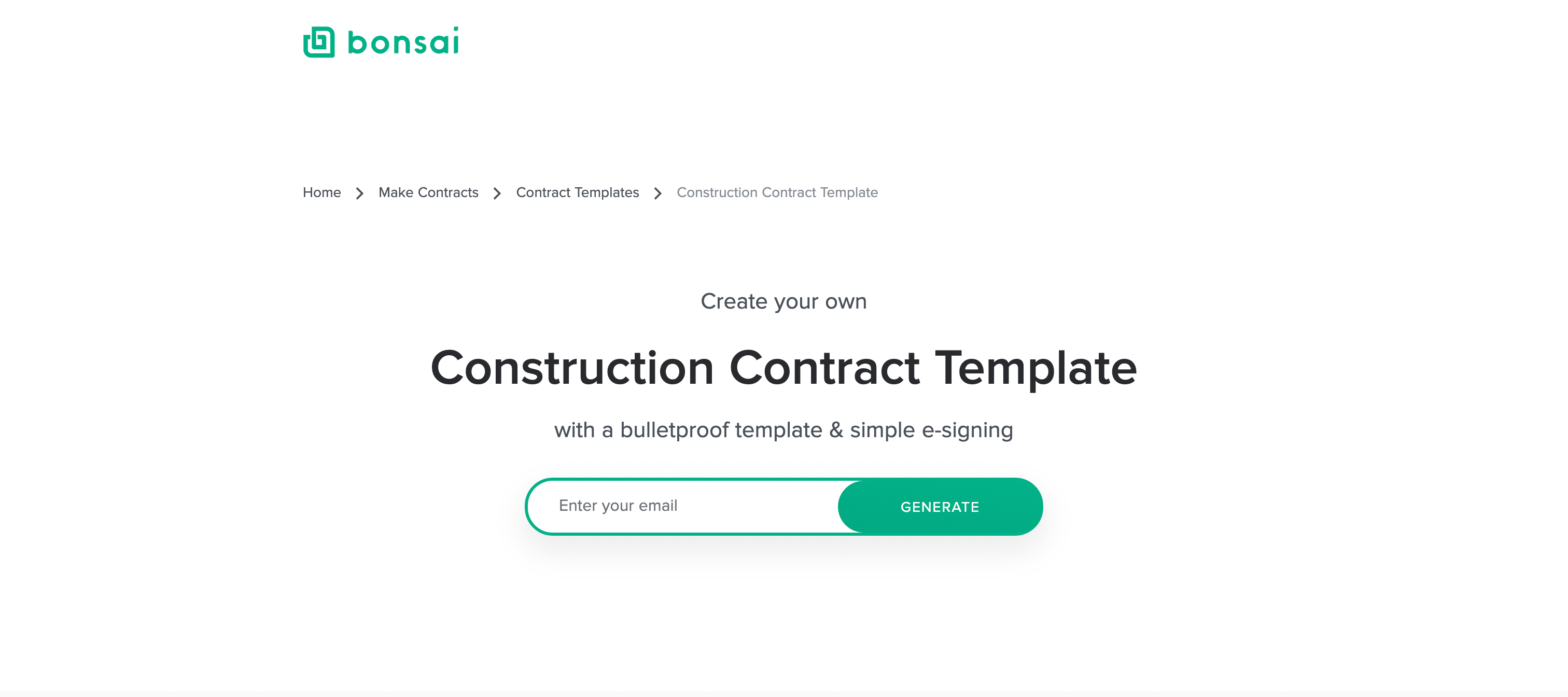Construction projects can be complex, pricey and prone to disagreements over cost, quality, timing of payments, or other difficulties. After you write a construction proposal, you'll need to get a contract signed. A solid construction contract offers direction and a clear road map for all parties, which helps avoid conflicts in the first place. Plus, without a good contract, you'll increase the risk of losing money.
The contract may be provided by any party, including the owner, architect, contractor, or attorney. However, since every contract favors one party over the other, it's worth identifying and creating a contract that safeguards your interests. But how do you choose the type of contract that best suits the project?
To help you choose, we'll go over 5 of the most common construction contracts to outline their general features and give you a better idea of what path to take. But first let's quickly go over the basic elements that a construction contract must cover.
Note: Instead of wasting time creating a contract from the start, use Bonsai's online contract creator to dive right into the finer points of contract building for each client. Our editable contract templates are legally backed and designed to meet your business needs.
What Must Be Included In a Construction Contract?
Your contract must specify the work's scope and the lump sum that will be paid. Additionally, it should outline any subcontracted work and state the legal obligations for any completed building. These are the must-have provisions in your agreement:
- Explanations of the work and parties engaged in detail including your tasks, responsibilities as well as those of each involved stakeholder.
- Project timeline and key turning points, including deadlines that you and your team are accountable for.
- The terms and conditions for payment.
- Obligations and rights of both the owner and the contractor establishing who owns what, insurance coverage, government inspections needed, and applicable laws to both parties.
- A contract cancellation clause in case your customer is no longer able to afford the services, or may be unable to proceed due to a complication.
- You may include other items such as the procedure for handling dangerous materials, details for contacting legal counsel, and other applicable laws that are relevant to your locality but weren't previously mentioned.

5 Common Types Of Construction Contracts
There are many different types of construction contracts available to meet the demands of all parties involved. After all, no two building projects are the same. Owners, contractors, and suppliers are able to control risk and make sure that the work as well as payment process runs as smoothly as possible by knowing which construction contract suits the project the best.
Let's go over some of the most common options.
Lump Sum Contracts
This is the most basic kind of construction contracts, also commonly referred to as a fixed price contract. Lump sum contracts are quite popular in the construction industry because they provide a single fixed price for every work completed under them. They make bidding simpler, allowing customers to name a set price as opposed to making numerous bids, giving contractors a chance for high profit margins when finishing on time or under budget.
However, you must take into consideration every possible circumstance when drafting a lump sum contract as unexpected delays or adjustments throughout a project directly reduce your profit margin.
When to Use
Because the potential for failure increases with project size, lump sum contracts are best for smaller projects with a defined timeline and known scopes of work. If these are not explicitly agreed upon, it may be challenging for builders to predict costs in advance and avoid over scoping.
Time and Materials Contracts
Time and materials contracts specify an hourly rate or daily cost. Your customer also agrees to pay any associated project costs, listed in the contract as direct, indirect, markup and overhead costs, in addition to this rate. This contract often includes a price or project duration restriction to reduce the customer's risk. They also entail less risk when working on small projects, where the customer can more accurately predict the project's scope and thus, the eventual cost.
When to Use
Time and materials contracts are frequently used in cases where the scope of the project is not clear. Because they are more flexible and the customer reimburses you for the cost of materials paying you an hourly salary, all unexpected delays, obstacles, and other modifications to the project are conveniently covered.
Cost-Plus Contracts
A cost-plus contract, covers the cost of the supplies, materials and labor, as well as an additional fee to cover the contractor's profit. The charge may be either a predetermined fixed amount or a percentage of the project's overall costs. It may potentially include overhead costs in addition to project costs such as travel costs and a percentage of the contractor's office and administrative costs.
Unlike a time and materials contract, with cost-plus contracts, the contractor will charge for all costs incurred plus a fixed fee, instead of an hourly labor rate. Keep in mind you will be required to keep meticulous records of your spending and may need to provide justification to clients. You may also need funding upfront to pay for materials for the project.
When to Use
Cost-plus contracts work best for projects with a hazy scope or lots of uncertain variables. Most cost-plus agreements do have a "not to exceed" cap that establishes certain financial restrictions, but most of the time, they entail a higher risk for the project owner because they are responsible for covering any unexpected costs.
Unit Price Contracts
Another sort of contract that is frequently utilized by builders and federal organizations is a unit price contract. Here, you break down the overall amount of work necessary to finish a project into smaller parts. Instead of giving the owner a price estimate for the entire project, the contractor gives the owner price estimates for each individual item of work. This is especially helpful if a certain element, like a special material needed for the project, is driving up the total cost and increases the customer's understanding of the contract's transparency.
Unit price contracts also make it simpler to manage change orders and other modifications to the scope of work when any additional work is simply tacked on as another pre-priced unit. Keep in mind, although we should all work to be more transparent, a re-measurement of construction projects, or the owner's capacity to contrast the actual cost of each unit with the project's overall cost, might cause a payment delay.
When to Use
Smaller projects like repair or maintenance work are better suited for unit price contracts, which can often be amended if the project's scope changes in some way. When the scope of the work changes, unit pricing contracts make it simpler to modify prices. Because the contractor and the owner split the risk, this type of contract is not suitable for intricate projects involving numerous unique components and materials.
Guaranteed Maximum Price (GMP) Contracts
A guaranteed maximum price contract sets a limit on the final budget of a construction project. Here, the contractor is responsible for any overages, whether they involve labor costs or materials, so even though the project owner's budgeting process is meant to be made simpler, some financial risk is transferred to the contractor. On the bright side, when a project is completed on time and within budget, you may incorporate a clause to split any project savings with the customer.
A GMP contract might be a separate agreement or it can simply include a guaranteed maximum price and other particular parameters in another kind of agreement. For instance, a clause that restricts total costs to a set maximum price could be included in a cost-plus agreement.
When to Use
Construction contracts frequently include guaranteed maximum prices, which work well for projects with minimal unknowns such as the development of a retail chain using tried-and-true plans. Since there is a set project cost threshold, these contracts are also an excellent choice for clients with limited funds.

Write Bulletproof Construction Contracts With Bonsai
Bonsai has the perfect contract template for your construction business. We help you get started with templates that have been legally reviewed by top contract lawyers and thousands of freelancers in the industry. You can fully customize every aspect of the contract to fit your needs and send it over using a secure link, implement a legally-binding e-signature to speed up the process of signing up a new client.
Once you send out your contract, you can also keep your client informed with automatic reminders and notifications for review and countersigning. With this, and many more administrative tools at your disposal, Bonsai is your best bet, whether you're just starting or your business is booming!






